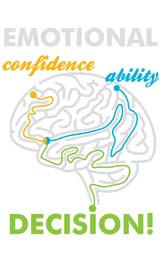INSIDER: Consumer Emotional Confidence
By Preston Sneed, MBA Candidate, Dec. 2009
How does emotional intelligence affect consumer choices? In Emotional Calibration Effects on Consumer Choice published in the Journal of Consumer Research in December 2008, authors Blair Kidwell, David M. Hardesty, and Terry L. Childers explore the effects of emotional intelligence on the decision making process of consumers. The researchers look at the effects of consumers' emotional confidence and its relation to the consumers' emotional ability in making decisions.
THINK POINT #1
The authors point out that consumers make decisions based on both a thoughtful component (knowledge gained through experience) and an emotional component (knowledge of one's own feelings). Both of these components are made up of both ability and confidence (i.e. consumers have intellectual ability and confidence as well as emotional ability and confidence). It should be noted that there is a wide spectrum of consumers who fit into different levels of ability and confidence with respect to both thoughtful and emotional intelligence. Depending on where a particular consumer fits on the spectrum, the quality of his/her decisions is greatly impacted when the customer is faced with different scenarios. The following table, constructed from the information in the article, shows differences in emotional confidence and ability levels, their characteristics, and their impact on decision making. Level Emotional Confidence Emotional Ability Characteristics Quality of Decision 1 Low Low Underperformance when compared to other groups Lowest 2 High Low Too much confidence without the emotional ability Lower 3 Low High Suffer anxiety which may lead to frustration when making consumer-related decisions Low 4 High High Prideful in decision making; without frustration or anxiety Highest 
THINK POINT #2
For a buyer, purchasing a home can be stressful. Anything that you can do to reduce uncertainty in a consumer's purchase decision will help the consumer overcome their own doubts and other emotions. Being transparent and upfront about a property with respect to condition and price can help aid those individuals who have lower emotional confidence and ability.
THINK POINT #3
If emotional miscalibration was written as a formula it would be equal to either a lack in emotional confidence, emotional ability, or both. Consumers who are balanced emotionally would have a high level of emotional confidence and ability meaning that they would be prideful in their decisions and have little anxiety or frustration. If a consumer is unbalanced in emotional ability and emotional confidence, then they are more likely to make poor purchase decisions.
THINK POINT #4
Presentation is everything. Vivid images and displays influence consumer purchase decisions. Make sure that the things you can control such as presentation of advertising and photographs are aesthetically pleasing to the eye. This can be pictures of a selling property or even your personal business cards. With pictures of the property, make sure sharp photos are taken from different angles, in different light, in good weather conditions, etc. to make the photo as vivid as possible. For personal business cards, make sure that your self-photo is in color and is a sharp image. Vivid photos will paint an image with a lasting impression in the buyer's mind and will go a long way in making a potential sale or gaining future business. Do not mislead the customer or take advantage of his or her lack of emotional intelligence, but do create a vivid display of property photos, logos, business card photos, etc.
THINK POINT #5
When you are selling a property, venture out into the future with the buyer. Speak of the surrounding environment that could impact the buyer's emotional knowledge. This could take the form of speaking about a strong school system in the area that the buyer's children would be attending in the future, or it could be more development in the surrounding area which may increase the property value of the home in the future. Please note, the research conducted was not in real estate, though the core findings of the impact of emotions on decisions are relevant to your field. The results of this research should not be applied blindly, but with serious thought as to how they might be relevant in your particular market.
. . . . . . . . . . . . . . . . . . .
About the Author:
Preston Sneed, MBA Candidate, Dec 2009, Baylor University
Graduate Assistant, Keller Center for Research
Preston is a second year graduate student from Kingsport, TN. He earned his BS in Financial Economics and his BA in Spanish from Carson-Newman College.